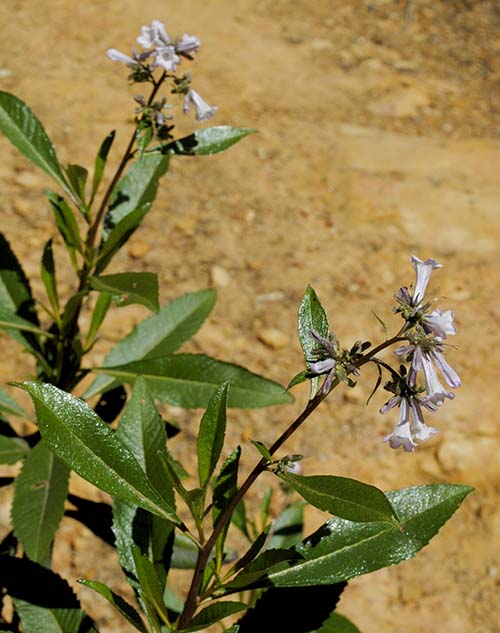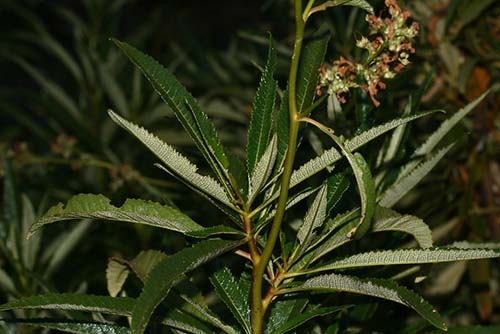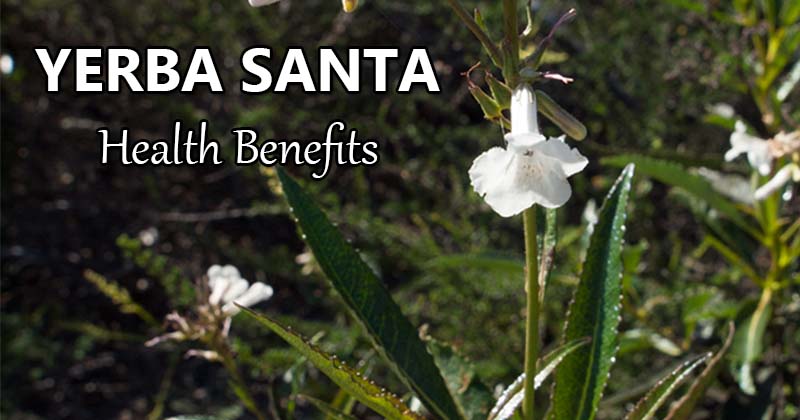Friends of mine who live near the Sacramento Valley often forage for yerba santa. The plant is surprisingly easy to find. Despite its abundance and a very long history of medicinal use, few people know about the benefits and many uses of yerba santa.
What Is Yerba Santa?
Yerba santa is a shrub in the same family as borage. It grows in parts of California and Oregon and has a long history of medical use by Native Tribes from the region. These tribes introduced it to Spanish settlers in the area who then gave it its name, which means “holy herb” or “sacred herb” in Spanish.
As a plant, yerba santa is very hardy and even thrives after forest fires. It grows to be two to eight feet tall and has long branches. The mature leaves often have a black fungus growing on them. A unique feature of yerba santa is that the plant has a bitter taste but then gets sweeter. Because of this, yerba santa has been researched as a way to mask the bitter taste in foods.

Other Names for Yerba Santa
- Eriodictyon californicum (from Greek meaning “wool net” in reference the fuzzy underside of leaves)
- Mountain Balm
- Bear’s weed
- Gum bush
- Gum plant
- Consumptive weed
Health Benefits of Yerba Santa

Yerba santa leaves have long been used as a medicinal remedy for various ailments. Modern research has confirmed many of these uses, primarily attributing them to a unique antioxidant called sterubin. Below are the main health benefits of yerba santa which are backed by science.
Coughs, Respiratory Conditions and Allergies
Traditionally, yerba santa was mainly used for coughs and other respiratory problems, including chronic asthma. The plant works by relaxing smooth muscle tissue in the lungs. It also acts as an expectorant, meaning it helps loosen and expel mucus from the airways.
Alzheimer’s Disease and Neuroprotective
One of the most promising uses for yerba santa is to prevent and treat Alzheimer’s disease. This benefit is attributed to the antioxidant sterubin which is found in the plant. Sterubin helps protect against cell death (oxytosis and ferroptosis). It also reduces inflammation in microglial cells which are specialized cells found in the central nervous system.
Researchers are mostly focused on the benefits for Alzheimer’s treatment, but sterupbin could also protect against other age-related damage to the brain.
*Sterubin is also found in a few other medicinal plants, including Artemisia monosperma and Thymus mastichina (Spanish marjoram).
Potent Antioxidant
In addition to sterubin, Yerba santa contains many strong antioxidants, including: tannins, phenols, flavonoids, saponins, terpenoids, cardiac glycosides and phlobatannins. Studies show these antioxidants are very effective in reducing the effects of oxidative stress on the body. This means that yerba santa could be used for treating many diseases such as diabetes, heart disease or cancer.
Inflammation
While this benefit hasn’t been studied as much, yerba santa has been shown to act as an anti-inflammatory agent. This benefit explains why yerba santa is often used as a treatment for inflammation-related disorders like arthritis.
Antimicrobial
Yerba santa has long been used to treat bacterial infections, such as when applied to wounds as a poultice. Research confirms this use: studies show that substances in yerba santa (such as the antioxidant eriodin) can kill gram-positive bacteria and acid-fast organisms such as Mycobacterium tuberculosis.
Depression
Some research suggests that a natural chemical found in yerba santa called Pinocembrin can treat depression. In addition to this, the neuro-protective benefits of yerba santa might help protect against depression and other mental health disorders.
Cancer
The antioxidants in yerba santa fight against free radical damage, thus helping to prevent cancer. However, yerba santa seems to work in other ways to fight against cancer too. Some flavonoids, such as luteolin, have been shown to kill cancer cells and prevent them from replicating.
How to Use Yerba Santa Medicinally
Traditionally, yerba santa was consumed as a tea in order to get medicinal benefits. Because the tea is rather unpleasant tasting, most people today instead use extracts from dried yerba santa leaves. The extract also has the benefit of being much stronger than a tea, so you don’t have to take as much to get benefits. Yerba santa extracts can be consumed directly, inhaled or used in throat and nasal sprays.
Yerba Santa Dosage
A typical dosage of yerba santa is about 1ml of extract taken once per day. With a menstruum ratio of 1:3, that is approximately 330mg of dried herb. When making tea from yerba santa, a strength of 3 leaves per cup of water is used.
It is also very common to find yerba santa in formulations with other herbs with respiratory benefits, such as elecampane, horehound, usnea lichen, thyme and lobelia.
Side Effects and Safety
Yerba santa is generally considered safe to use. It is not recommended for breastfeeding or pregnant women though because it in can interfere with iron absorption. Because it is astringent and dries out mucus, yerba santa can cause dry mouth if taken in large doses. As with any other supplement, make sure you talk to your doctor before taking yerba santa.
Best Yerba Santa Supplements
The list of yerba santa supplements below are all from reputable brands. Some of the products are formulated for cough, cold or allergies, but there are also alcohol and glycerin yerba santa extracts.
Herb Pharm Lung Expectorant Formula
- Type: Alcohol extract
- Formulated for: Wet cough
- Contains: Yerba santa, elecampane, osha root, usnea lichen, thyme, lobelia, and ginger
- Buy Here
Secrets of the Tribe Santa Yerba Extract
- Type: Glycerin extract
- Contains: Yerba santa, menstruum ratio 1:3
- Buy Here
Herba Tierra Yerba Santa Extract
- Type: Glycerin extract
- Contains: Yerba santa, menstruum ratio 1:3
- Buy Here
Pretz Yerba Santa Nasal Spray
- Type: Glycerin extract in saline solution spray
- Formulated for: Congestion
- Contains: Yerba santa in glycerine extract, saline solution
- Buy Here
Wish Garden Kick Ass Allergy
- Type: Glycerin extract
- Formulated for: Allergy relief
- Contains: Yerba santa, nettle, Echinacea and orange peel
- Buy Here
Wish Garden Cold Season
- Type: Glycerin and alcohol extract
- Formulated for: Colds
- Contains: Thyme, elder flower, wild cherry bark, yerba santa, sage, goldenrod, peppermint and horehound
- Buy Here







